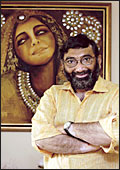|
 Amar
Babu, Intel India's managing director
for sales and marketing, must have mixed feelings about his relocation
to the US. He must surely be happy that he is exchanging country-specific
responsibilities for a larger corporate role at Santa Clara, but
at the same time sad that he will miss all the action back home.
In the seven years that Babu, 40, has been with Intel India, the
local marketing business has grown from a four-city set up to
an estimated Rs 2,733 crore in annual revenues for 2004-05 (Intel
doesn't disclose figures). Of late, however, a reinvigorated rival,
AMD, has been growing its market share aggressively (up from 17
per cent to 23 per cent just past year). "The competition keeps
us honest, but we are streets ahead of them in the local market,"
says Babu. His India lessons may just come handy in the US. Amar
Babu, Intel India's managing director
for sales and marketing, must have mixed feelings about his relocation
to the US. He must surely be happy that he is exchanging country-specific
responsibilities for a larger corporate role at Santa Clara, but
at the same time sad that he will miss all the action back home.
In the seven years that Babu, 40, has been with Intel India, the
local marketing business has grown from a four-city set up to
an estimated Rs 2,733 crore in annual revenues for 2004-05 (Intel
doesn't disclose figures). Of late, however, a reinvigorated rival,
AMD, has been growing its market share aggressively (up from 17
per cent to 23 per cent just past year). "The competition keeps
us honest, but we are streets ahead of them in the local market,"
says Babu. His India lessons may just come handy in the US.
 A
Vision For IT A
Vision For IT
What's
the co-father of one of management's top buzzwords, reengineering,
up to these days? Taking a close look at Indian it. James Champy,
64, who wrote Reengineering the Corporation with Michael Hammer,
is currently the Chairman of Perot Systems' consulting practice,
and keen on ramping up the relatively small it vendor's India
operations. Behind the plan is his belief that players such as
CSC and EDs "are very American in their style of functioning and
it's not clear if they can survive in a global market", while
the Indian it firms need to "enter into technology-enabled areas
like remote it management, rather than people-centric ones". Read
more about it in his next book due in two years.
Glad
To Make Way
 Not
too many CEOs fancy quitting ahead of their time. But euro-RSCG's
Ishan Raina, who's stepping down two years ahead of his
self-set retirement age of 50, has no such problems. "CEOs should
be changed every 10 years because fresh minds induce freshness
in the way an organisation thinks and works," says Raina, who
set up the Havas-owned outfit from scratch. Does he rue the fact
that he couldn't make it a top-five agency on his watch? Raina
sees it differently. "We were the only MNC start-up here in India
till Dentsu came three years ago...(and) focussed on organic growth,"
says the alumnus of IIM Calcutta. Suman Srivastava, Raina's first
hire 10 years ago, takes over as the new CEO. Raina will continue
to be the Chairman, but don't be surprised if he soon finds another
job worth his next 10 years. Not
too many CEOs fancy quitting ahead of their time. But euro-RSCG's
Ishan Raina, who's stepping down two years ahead of his
self-set retirement age of 50, has no such problems. "CEOs should
be changed every 10 years because fresh minds induce freshness
in the way an organisation thinks and works," says Raina, who
set up the Havas-owned outfit from scratch. Does he rue the fact
that he couldn't make it a top-five agency on his watch? Raina
sees it differently. "We were the only MNC start-up here in India
till Dentsu came three years ago...(and) focussed on organic growth,"
says the alumnus of IIM Calcutta. Suman Srivastava, Raina's first
hire 10 years ago, takes over as the new CEO. Raina will continue
to be the Chairman, but don't be surprised if he soon finds another
job worth his next 10 years.
 One
For OPK One
For OPK
At
a time when some foreign investors seem to be having serious doubts
over India's low-cost benefits, it's reassuring to have someone
like Olli-Pekka Kallasvuo, aka OPK, around. Nokia's Global
CEO of one month has announced plans of moving the telecom equipment
giant's managed services business from home country Finland to
India. Nokia's brand new Global Networks Solutions centre is already
up and running in Chennai, and will eventually serve as the hub
for its operation centres around the world. "The strong outsourcing
ecosystem in India and the availability of innovation are the
key drivers for this move," explains Ashish Chowdhary, Nokia's
Country Director, who is slated to head Global Managed Services
by the year-end. And don't forget that Nokia also recently opened
a plant in Chennai.
Barclays' Catch
 Home-grown
HDFC bank seems to have become a poaching ground for foreign banks.
A year ago, Standard Chartered lured away Country Head for Retail,
Neeraj Swaroop, and now it's another global financial services
major, Barclays, that has snagged Samir Bhatia from HDFC
Bank. Bhatia, 43, was one of the founding executives of the bank
in the mid-90s and most recently headed its commercial banking
business. Therefore, he seems tailor-made for Barclays' India
plans. The British banking major, which has been in India since
the late 80s, but with little to show, plans to pump in $220 million
(Rs 1,012 crore) to boost its investment banking and commercial
banking businesses. Bhatia, who did a seven-year stint with Citi
before joining HDFC Bank, will have to hit the ground running.
Barclays intends to more than triple its India headcount to 150
in the medium term. Besides, Barclays is currently a small player
in both the M&A (mergers and acquisitions) and commercial banking
markets, and non-existent in retail. With other big international
banks such as Deutsche Bank already making their moves, Bhatia
needs to come up with some smart strategies. Home-grown
HDFC bank seems to have become a poaching ground for foreign banks.
A year ago, Standard Chartered lured away Country Head for Retail,
Neeraj Swaroop, and now it's another global financial services
major, Barclays, that has snagged Samir Bhatia from HDFC
Bank. Bhatia, 43, was one of the founding executives of the bank
in the mid-90s and most recently headed its commercial banking
business. Therefore, he seems tailor-made for Barclays' India
plans. The British banking major, which has been in India since
the late 80s, but with little to show, plans to pump in $220 million
(Rs 1,012 crore) to boost its investment banking and commercial
banking businesses. Bhatia, who did a seven-year stint with Citi
before joining HDFC Bank, will have to hit the ground running.
Barclays intends to more than triple its India headcount to 150
in the medium term. Besides, Barclays is currently a small player
in both the M&A (mergers and acquisitions) and commercial banking
markets, and non-existent in retail. With other big international
banks such as Deutsche Bank already making their moves, Bhatia
needs to come up with some smart strategies.
 Joining
Ranks Joining
Ranks
Qualcomm's
global CEO, Paul Jacobs, had better turn on the charm after he
lands in India on June 26. As if Anil Ambani's Reliance Communications
threatening to go the GSM way wasn't bad enough for Jacobs' competing
CDMA technology company, its only other customer in the country,
Darryl Green-headed Tata Teleservices, has also decided
to take up the issue of royalty. Unlike Reliance, the Tata Group
company doesn't have a presence in GSM-based mobile telephony
(it recently exited that business by selling its stake in Idea
Cellular) and has fewer subscribers (just under 10 million) than
the former (about 19 million). But Green, 45, has decided that
a cut in royalty is needed to make his company more competitive.
It will be interesting to see how Qualcomm responds to the twin
assault.
-Contributed by Rahul Sachitanand,
Archna Shukla, Pallavi Srivastava,
Anand Adhikari and Krishna Gopalan
|




 A
A A
Vision For IT
A
Vision For IT N
N One
For OPK
One
For OPK H
H Joining
Ranks
Joining
Ranks